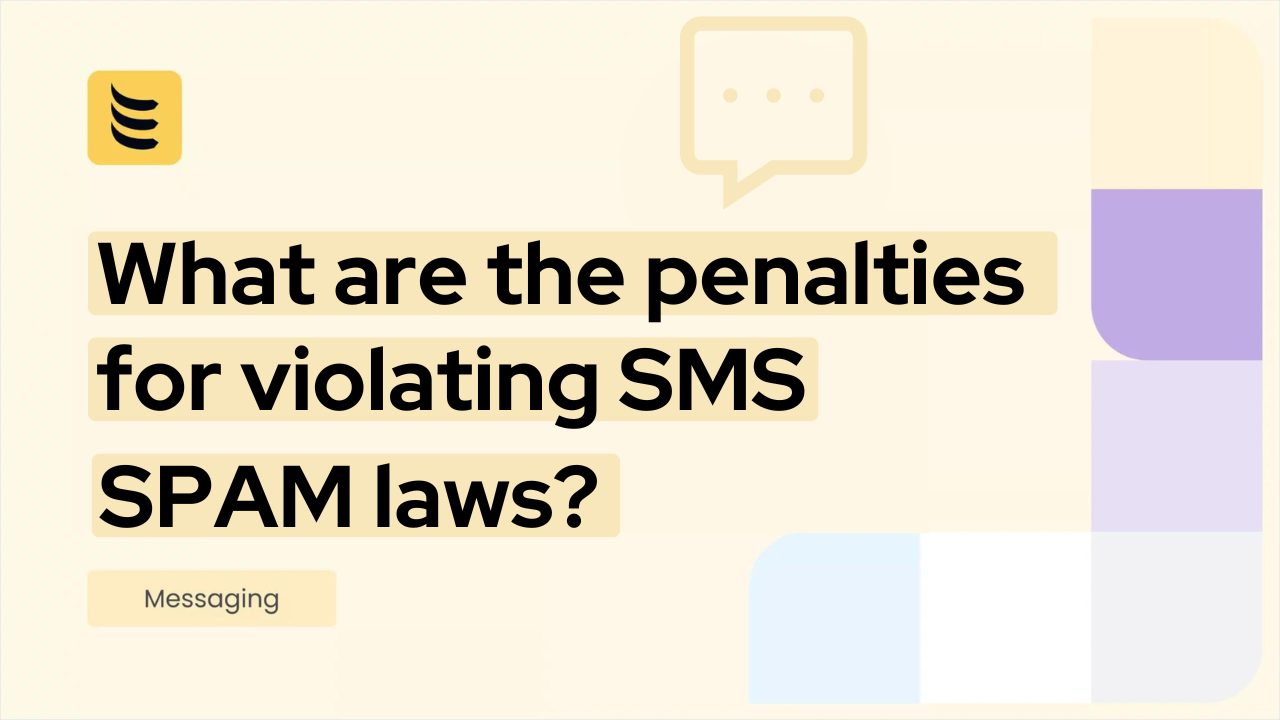Introduction
Imagine a small business sending thousands of text messages in one afternoon. No consent. No opt-in. Just a flood of promotions landing in inboxes. What feels like quick marketing soon feels like spam to the people receiving it.
For customers, these texts are more than annoying. They break trust. They create frustration. Many will block the sender. Some will complain to carriers or regulators. What looked like a cheap way to get attention can turn into a very costly mistake.
This is where SMS spam laws come in. They exist to protect people from unwanted messages and to keep SMS a trusted channel for communication. These laws carry real penalties, and in many regions, fines can add up to thousands of dollars for a single campaign.
While the exact rules differ from country to country, the warning is clear. Violating SMS spam laws can drain money, damage reputation, and put a business in legal trouble.
Why SMS Spam Laws Exist
No one likes spam. It clutters inboxes, wastes time, and feels like an invasion of privacy. When a business sends texts without consent, it crosses a line. People don’t just ignore those messages. They get angry.
SMS spam laws were created to stop that. The goal is simple: give people control over who can contact them. These laws make sure that messages are wanted, not forced onto someone’s phone.
They also protect trust. Text messaging is personal. People use it for banking alerts, doctor reminders, and family chats. If spam takes over, trust in SMS disappears. And when trust is gone, even useful messages may get ignored.
There’s also a safety side. Many spam texts are not just unwanted—they can be scams. Laws help block fraud before it spreads. They give regulators the power to fine businesses and cut off bad actors.
In short, SMS spam laws keep texting reliable. They protect both customers and the businesses that play fair.
Key SMS Spam Laws Around the World
Spam laws aren’t the same everywhere. Each country sets its own rules, fines, and regulators. If your business sends texts across borders, you need to know how these laws work. Here’s a closer look.
United States
The main law in the US is the Telephone Consumer Protection Act (TCPA). It requires businesses to get clear consent before sending marketing texts. If you break it, each unwanted message can cost $500. If the court decides it was willful, that amount can jump to $1,500 per text.
The CAN-SPAM Act also covers texts, though it’s better known for email. It requires businesses to identify themselves, give people a way to opt out, and avoid misleading content.
What makes the US even trickier is that states can add their own rules. For example:
Florida passed a “mini-TCPA” in 2021. It limits automated texts and requires express written consent.
Oklahoma has a similar law. Both states opened the door for lawsuits beyond the federal TCPA.
Because of these state laws, a text campaign that’s legal in one state may not be legal in another. Many businesses have faced lawsuits in Florida alone for failing to follow the extra rules.
Canada
Canada’s law is called CASL (Canada’s Anti-Spam Legislation). It’s one of the toughest in the world. Businesses need clear consent before sending texts, and consent records must be kept. Fines can go up to 10 million CAD for companies and 1 million CAD for individuals.
The Canadian Radio-television and Telecommunications Commission (CRTC) enforces CASL. They’ve fined big telecoms and small companies alike. Even “I didn’t know” isn’t a good excuse under CASL.
European Union
In the EU, two major laws apply:
ePrivacy Directive: requires opt-in consent for SMS marketing.
GDPR (General Data Protection Regulation): controls how personal data (like phone numbers) is collected, stored, and used.
If you send texts without consent, you may face fines under both. GDPR penalties can be huge — up to €20 million or 4% of global revenue, whichever is higher. Some EU countries have stricter enforcement than others, but across the board, regulators take privacy very seriously.
United Kingdom
After leaving the EU, the UK still follows similar rules under the Privacy and Electronic Communications Regulations (PECR). The Information Commissioner’s Office (ICO) enforces them. Companies have been fined hundreds of thousands of pounds for SMS spam.
Australia
Australia has the Spam Act 2003. It requires consent, identification of the sender, and a working opt-out. The Australian Communications and Media Authority (ACMA) enforces it, and fines can climb into the millions. Big names, including banks and telcos, have been penalized.
Other Regions
Singapore: The Personal Data Protection Act (PDPA) requires consent for texts.
India: The Telecom Regulatory Authority of India (TRAI) has strict rules on unsolicited commercial communication. Violations can lead to disconnection of telecom services.
New Zealand: The Unsolicited Electronic Messages Act applies, with fines up to $500,000 NZD.
In short: every region has rules, and many are harsh. The US is complex because of state-level laws. Canada is strict. The EU and UK hand out massive fines. Australia has strong enforcement. Even smaller countries have regulations that can shut down a business overnight.
If you send SMS campaigns, knowing these laws is not optional. It’s survival.
Penalties for Violating SMS Spam Laws
Breaking SMS spam laws isn’t just a slap on the wrist. The fines can be massive, lawsuits can pile up, and the damage to a brand’s name can last longer than the legal case itself. Let’s look at what happens when companies cross the line.
Fines Per Message
In the United States under the TCPA, every unwanted text can cost $500. If a court decides the sender knew what they were doing, the fine jumps to $1,500 per message. Imagine sending just 1,000 texts without consent. That’s a potential $1.5 million bill. And that’s not rare — businesses have faced these numbers in real cases.
In Canada, fines under CASL can reach 10 million CAD for companies. The CRTC has fined both small businesses and household names. Even one badly managed campaign can put a company on the hook for hundreds of thousands.
In the EU, fines under GDPR and ePrivacy aren’t capped by the number of messages. They’re tied to revenue. A large company can face penalties in the tens of millions of euros if regulators decide it broke the rules.
Class-Action Lawsuits
In the US, the real threat often isn’t regulators. It’s lawyers. Class-action lawsuits under TCPA have hit companies like Taco Bell, Papa John’s, and banks for millions of dollars. Even if a business settles, the legal costs are crushing.
Enforcement Actions
Regulators don’t just fine. They can issue orders that stop a company from sending any messages until compliance is proven. In some countries, telecom carriers can cut off a business’s SMS traffic if they’re flagged as a spam sender.
Reputational Damage
The financial hit is bad enough, but reputation damage cuts deeper. Customers who feel harassed or scammed by spam rarely come back. Carriers can also mark numbers as “spam likely,” making even legal campaigns less effective.
Real-World Examples
A US retail chain was fined millions after a TCPA class-action over unwanted texts.
In Canada, Compu-Finder was fined $1.1 million CAD for breaking CASL.
In Australia, Optus and Woolworths faced fines for sending marketing texts without proper consent.
These aren’t just small companies making mistakes. Big brands have been caught, and the costs are very public.
The message is simple: one careless campaign can wipe out years of hard work. Fines, lawsuits, blocked numbers, and angry customers aren’t worth the risk.
Notable Cases and Examples
It’s one thing to read about fines on paper. It’s another to see how they play out in the real world. Over the last decade, regulators and courts have made it clear that SMS spam has a real price tag.
Papa John’s (United States)
In 2013, Papa John’s faced a $250 million class-action lawsuit under the TCPA. The case claimed customers received hundreds of thousands of unwanted texts promoting pizza deals. The company eventually settled for $16.5 million. It remains one of the largest SMS spam settlements in US history.
Jiffy Lube (United States)
Jiffy Lube also got hit with a TCPA lawsuit after sending promotional texts without consent. Customers alleged they never agreed to receive texts about oil changes and car services. The company settled for $47 million in 2012.
Compu-Finder (Canada)
In 2015, Canada’s CRTC fined Compu-Finder $1.1 million CAD for breaking CASL. The company sent commercial emails and texts without consent and failed to provide a proper unsubscribe option. CASL had only been active for a short time, and this case set the tone that regulators meant business.
Woolworths (Australia)
In 2020, Woolworths, one of Australia’s largest supermarkets, was fined $1 million AUD. The Australian Communications and Media Authority (ACMA) found the company sent over five million marketing emails and texts to customers who had already unsubscribed. It showed that even big, trusted brands are not immune to spam penalties.
Flybe and Honda (United Kingdom)
In 2017, the UK’s ICO fined Flybe £70,000 for sending over 3.3 million emails and texts to people who had opted out. Honda was fined £13,000 for similar issues. While smaller than US and Canadian fines, these cases showed UK regulators would act against spam texts.
Why These Cases Matter
These are not small companies or shady operators. They’re well-known brands with legal teams and marketing departments. And still, they were caught and fined. The lesson is clear: no company is too big, too small, or too trusted to avoid penalties if they ignore consent rules.
How to Stay Compliant
The good news is that avoiding SMS spam penalties isn’t complicated. Most of it comes down to respect for your audience and smart practices. Here are the key steps every business should follow:
1. Always Get Opt-In Consent
Consent is the golden rule. Never send a text unless the person has agreed to receive it. There are two types of consent:
Explicit consent: Someone signs up directly, like entering their number in a web form and ticking “I agree to receive texts.”
Implied consent: A customer gives their number during a transaction, but even here, it’s best to confirm before sending marketing messages.
When in doubt, go explicit. It keeps your business safe.
2. Provide a Clear Opt-Out Option
Every text you send should give people an easy way to say “stop.” A simple “Reply STOP to unsubscribe” works. It’s clear, universal, and regulators expect it. Ignoring opt-outs is one of the fastest ways to land in trouble.
3. Maintain a Proper Contact Database
Don’t buy lists. They’re unreliable, often outdated, and usually filled with people who never gave consent. Build your list yourself through your website, checkout pages, or in-person signups. Keep it clean, update it often, and honor unsubscribe requests right away.
4. Use Verified and Registered Sender IDs or Short Codes
Sending messages from random numbers raises red flags. Carriers may block them, and customers may not trust them. Use registered short codes or verified sender IDs. They build trust and improve deliverability while keeping you aligned with regulations.
5. Partner With a Reputable Messaging Provider
Compliance isn’t just on you. The right provider can make all the difference. A trusted partner like IDT Express Engage ensures your SMS campaigns meet legal requirements, reach the right people, and stay out of spam folders. They also provide tools to manage opt-ins, opt-outs, and reporting so you can focus on your message.
Staying compliant is not just about avoiding fines. It’s about respect, trust, and keeping SMS a channel people welcome. With the right practices and the right partner, your campaigns can be both effective and safe.
Don’t let one careless text put your business at risk.
The cost of ignoring SMS spam laws is clear: heavy fines, angry customers, and damaged trust. But compliance doesn’t have to be hard. With IDT Express Engage, you get a platform built to keep your messaging safe, legal, and effective.
Our tools make compliance simple — from verified sender IDs and short codes to automatic opt-out handling and real-time reporting. You’ll have peace of mind knowing your messages are delivered the right way, to the right people, every time.
Whether you’re sending promotional offers, reminders, or transactional alerts, Engage keeps your campaigns clean and compliant while helping you build stronger customer relationships.
Protect your business and grow with confidence. Start your SMS journey with IDT Express Engage today.




